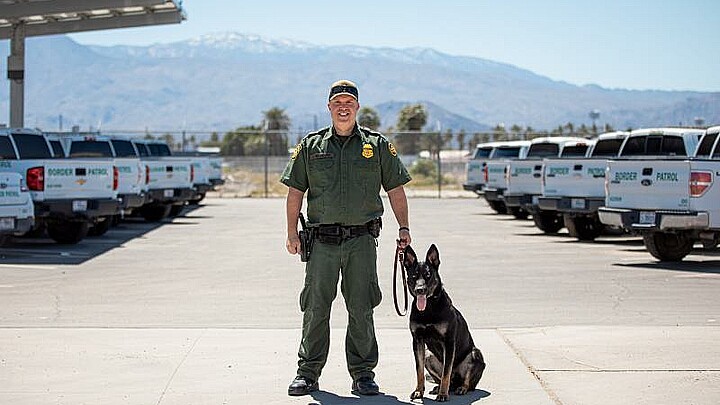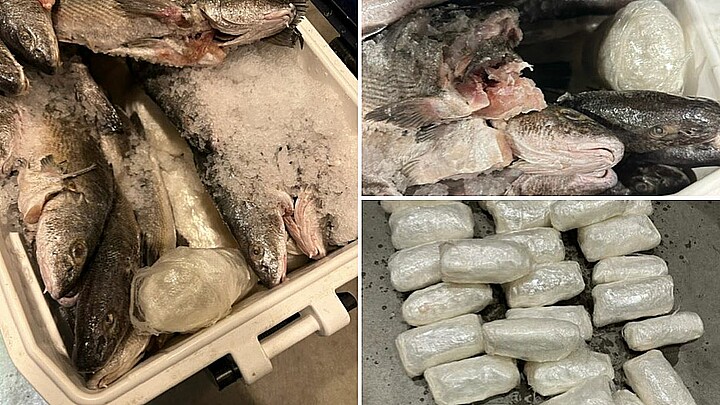Crime
San Diego border agents confiscate enough fentanyl to kill more than 23 million people
In one traffic stop, U.S. Customs and Border Protection officers at the Otay Mesa LPOE in San Diego County confiscated enough fentanyl to kill more than 23 million people.
July 15, 2022 12:15pm
Updated: July 16, 2022 10:07am
In one traffic stop, U.S. Customs and Border Protection officers at the Otay Mesa LPOE in San Diego County confiscated enough fentanyl to kill more than 23 million people.
Otay Mesa is the busiest commercial port in California. In FY21, CBP agents processed 5 million vehicles, 1 million trucks, and 2.1 million pedestrians.
On July 3, they confiscated more than 100 pounds of fentanyl hidden in food products smuggled in by two men entering California from Mexico.
They confiscated 42.46 pounds of powder and 59.08 pounds of pills, with an estimated street value of more than $1.2 million.
Roughly two milligrams of fentanyl, about the weight of a mosquito, is enough to kill a full-grown adult.
One ounce is enough to kill 14,174 full-grown adults; one pound is enough to kill 226,796 full-grown adults.
The 101.5 pounds CBP officials confiscated was enough to kill 23,028,882 full-grown adults.
“We are seeing a rise in fentanyl smuggling attempts,” Anne Maricich, CBP deputy director of Field Operations in San Diego, said. “Our officers are working vigilantly to prevent the entry of this dangerous drug. Our field office is also diligently working on mitigating the risks involved with seizing this lethal narcotic.”
Fentanyl, a synthetic opioid 50 to 100 times more deadly than morphine, is primarily brought into the U.S. illegally from Mexico.
The Otay Mesa LPOE is one of three ports of entry in San Diego for those entering the U.S. from Tijuana, Mexico. Tijuana is controlled by the Sinaloa Cartel, which has operational control of the U.S. southern border from California to Del Rio, Texas, law enforcement officials have explained to The Center Square. It’s believed to be the most powerful drug trafficking organization in the Western Hemisphere.
On July 3, Otay Mesa CBP agents stopped two male drivers attempting to enter the U.S. who showed a passport from an unnamed country and a California identification card, CBP said. It hasn’t yet disclosed their nationality.
During a cursory inspection of their vehicle, CBP agents discovered the fentanyl in 46 packages wrapped in plastic stuffed inside flour bags, ground coffee cans, creamer cans and powdered milk cans.
The men were turned over to the custody of Immigration and Customs Enforcement officials who are investigating the matter with Homeland Security Investigations officials. They were transported and booked into the Metropolitan Correctional Center in San Diego.
The cartel drug trade has been emboldened by President Joe Biden’s open border policies, the governors and attorneys general of Texas and Florida maintain. In Texas alone, in the last year, officials have confiscated enough fentanyl to kill nearly every man, woman and child in the U.S., Texas Gov. Greg Abbott recently said.
According to the latest available drug seizure data published by CBP, since Biden took office, “enough fentanyl has been seized at the U.S. southwest border to kill every man, woman and child in the U.S. seven times over,” Florida AG Ashley Moody has argued.
Fentanyl precursors are often first shipped from China to Mexican ports. Cartel workers then make fake opioid pills or lace other narcotics with them. The fake pills often look like authentic prescription pills used for pain, like OxyContin, Percocet and Vicodin. But heroin, cocaine, methamphetamine or benzodiazepines “may actually be fentanyl” or have been “adulterated or contaminated with fentanyl," the National Institutes of Health warns.
Fentanyl is less expensive to produce and easier to transport, doesn’t require farms or large facilities like cocaine production does, and can be compounded in people’s homes and garages. The finished products are brought into the U.S. illegally through an extensive cartel and gang network that operates throughout Mexico and the U.S.
Drug trafficking and distribution is a felony that carries hefty sentences and fines.
In 2018, for example, two California men pleaded guilty to one count of possession with intent to distribute fentanyl after Texas law enforcement officers confiscated 10 pounds of fentanyl from their vehicle. The maximum sentence was 20 years in federal prison and a $1 million fine.
Since then, the Biden administration has permanently added illicitly manufactured fentanyl-related substances as a Schedule I controlled substance under the Controlled Substance Act. The Drug Enforcement Agency explains that Schedule 1 substances are illegal, have a “high potential for misuse” and “no currently accepted medical use in treatment in the United States.” They are highly addictive and deadly.
The DEA has been warning Americans of the dangers of fentanyl, saying, “One pill can kill.”










